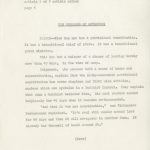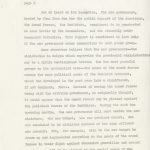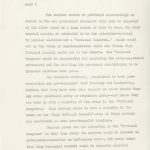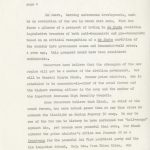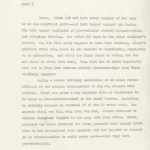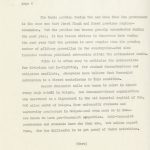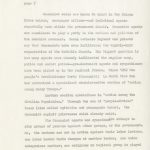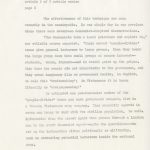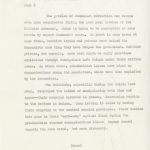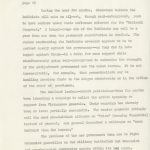1964, October, “The Problems of Governing”
deepe
article 5 of 7 article series
page 1
THE PROBLEMS OF GOVERNING
SAIGON—Viet Nam now has a provisional constitution. It has a transitional chief of state. It has a transitional prime minister.
This has but a whisper of a chance of lasting more than 49 days, in the view of many.
Saigonese, who possess both a sense of humor and superstitution , explain that the newly-announced provisional constitution has seven chapters and forty nine articles, numbers which are symbolic in a Buddhist funeral. They explain that when a Buddhist believer dies, his soul wanders around helplessly for 49 days when it becomes re-incarnated.
“And that is the new constitution,” one Vietnamese businessman explained. “It’s soul will wander around lost for 49 days and then it will re-appear in another form. It already has the smell of death around it.”
(More)
deepe
article 5 of 7 article series
page 2
But at least at its inception, the new government, headed by Phan Khac Suu has the public support of the Americans, the Armed Forces, the Buddhists, considered to be penetrated at some levels by the Communists, and the staunchly anti-Communist Catholics. This support is considered to last only if the new government makes concessions to each power group.
Some observers believe that the new government–the ministeries in Saigon which supervise the provincial administration may be a middle battleground between the two most powerful groups on the nationalist side–the power of the armed forces versus the mass political power of the Buddhist movement, which has developed in the past year into a significant, if not dominant, force. Instead of having the armed forces being with the civilian government, as originally thought, it would appear that the armed forces may be pitched against the political forces of the Buddhists. During the next two upcoming months, the new government will must decide the new ministers, the new budget, the new province chiefs, who are scheduled to be civilians instead of the army officers now present. But, for example, will be the new budget be drawn up and implemented according to the needs of the armed forces in their fight against Communist guerrillas and secret agents, or will it be slanted to the social needs of the civilian population in line with the “social justice” pleas of the Buddhists.
(More)
deepe
article 5 of 7 article series
page 3
The current series of political maneuverings to decide on the new government announced this week is regarded as the first round in a long series of more to come. The next crucial session is scheduled to be the selection–perhaps by popular election–of a “National Congress,” which would act as the House of Representatives while the 17-man High National Council would act as the Senate. The “National Congress would be responsible for approving the newly-appointed government and for drafting the permanent constitution to be finished sometime next year.
The Buddhist movement, considered to have pro-neutralist and pro-Communist lead leanings and leadership, believe that they have more mass support at lower levels than any other political party or organized group–and hence they can wind up with a majority of the votes in the “National Congress.” They already claim to have a majority of the votes on the “High National Council”–two of their members are considered to have pro-Communist leanings.
Current plans for the selection of the “National Congress” is that they would the members would be elected in government-controlled or influenced areas, but areas under Viet Cong Communist control would be accorded election privileges. This arrangement, which may undergo many changes before the final decision is made, would be in marked contrast to the legislative electilons held throughout the country only a year ago.
deepe
article 5 of 7 article series
page 4
In short, barring unforeseen developments, such as an escalation of the war in South East Asia, Viet Nam faces a glimmer of a prospect of having in de factocoalition legislative branches of both anti-Communists and pro-Communists based on an official recognition of a de facto partition of the country into government areas and Communist-held areas. A year ago, this prospect would have been considered unthinkable.
Observers here believe that the strongman of the new regime will not be a member of the civilian government, but will be General Nguyen Khanh, former prime minister, who is scheduled to be commander-in-chief of the armed forces and the highest ranking officer in the army and the member of the important four-man High Security Council.
Some observers believe that Khanh, as chief of the armed forces, has more actual power than at any time since he entered the limelight on during January 30 coup. He may be one of the few men in history to have sustained two “half-coups” against him, yet become more powerful than ever,. For Khanh entered the prime minister’s office one January 30 as a front-man for the powerful Dai Viet political party and the his long-time friend, Maj. Gen. Tran Thien Khiem, who supplied the military power and plans for the coup, In addition, Khanh was forced to ask Maj. Gen. Duong Van Minh, leader of the first junta, to remain as chief of state, which had the effect of draining popular support from Khanh.
deepe
article 5 of 7 article series
page 5
Hence, Khanh did not have total support of the army or of his political party–and both turned against him during the late August onslaught of pro-Buddhist student demonstrations and religious rioting. But after 270 days in the prime minister’s office; the Dai Viet party appears to have been crushed, Khanh‘s military rival Gen. Khiem is now en route to Washington, supposedly to be Ambassador, and after the final round of voting for the new chief of state this week, Gen. Minhhas at least temporarily lost out to Phan Khac Suu–an elderly statesman-type whom Khanh willingly supports.
During a secret military conference of 40 armed forces officers at the seaside headquarters of Cap St. Jacques this weekend, Khanh was given a big sizeable vote of confidence to be named as Commander-in-chief of the Armed Forces. According to reliable sources he received 31 of the 40 votes cast; his nearest rival was Maj. Gen. Tran Van Don, former Minister of Defense whom Khanh toppled in his coup with four votes. Khanh received the votes although his young generals were openly irked that he had re-instated four generals had had toppled on January 30 on charges–which he could never prove–that they were pro-neutralist.
(More)
deepe
article 5 of 7 article series
page 6
The basic problem facing the new Phan Khac Suu government is the same one that faced Khanh and faced previous regimes–Communism. But the problem has become greatly exacerbated during the past year; it has become obvious to observers here during the past year that the problem is more complex than the growing number of military guerrillas in the countryside–but also includes serious political subversion within the nationalist ranks.
While it is often easy to criticize the nationalists for divisions and in-fighting, for student demonstrations and religious conflicts, observers here believe that Communist subversion is a direct contributor to this condition.
Secret Communist cells are known to exist in almost every high scholol in Saigon, one Communist-front organization was uncovered in a highschool in the old imperial capital of Hue, 400 miles norht of Saigon. Some university students and university professors in Saigon–and even more so in Hue–are known to have pro-Communist sympathies. Anti-Communist professors and students know who they are, but seldom report them, for the difficulty is to get proof of their activities.
(More)
deepe
article 5 of 7 article series
page 7
Communist cells are known to exist in the Saigon labor unions, newspaper offices–and individual agents reportedly work within the government itself. Communist agents are considered to play a party in the actions and policies of the Buddhist movement. Roman Catholic layment and priests say that the Communists have even infiltrated the tightly-knit organization of the Catholic Church. The biggest question is how many agents have already infiltrated the regular army, police and secret police–pro-Communist agents and sympathizers have been picked up in the regional forces. Since 1962 the people’s Revolutionary Party (Communist) inSouth Viet Nam has maintained a specialized administrative section of “Action Among Enemy Troops.”
Another section specializes in “Action Among the Civilian Population.” Through the use of “people-divider” teams (also called agitation and propaganda teams), the Communists exploit grievances which already exist.
The Communist agents and sympathizers attempt to play groups of persons against other groups, or the government. So, the workers are set in motion against their labor leaders; one labor leader hurls charges at another leader; one union antagonizes another; one religious or regional group is played off against another.
(More)
deepe
article 5 of 7 article series
page 8
The effectiveness of this technique was seen recently in the countryside In one single day in one province alone there were seventeen Communist-inspired demonstrations.
“The Communists take a local grievance and exploit it,” one reliable source reported. “Their covert ‘people-divider’ teams give general lecturers to large groups. Then the break the large group down into small groups of common interest–students, women, farmers–and in detail point up the gripes. They know the people afre not sympathetic to the government, and they create imaginary ills or government faults. In English, we call this ‘brainwashing’; in Vietnamese it is known literally as ‘brainsqueezing’!”
He estimated one pro-Communist member of the “people-divider” teams per each government outpost; five in a 140-man Vietnamese army company. They generally operate in seven man teams to work with the civilian population, he said. Information from the secret agent then passes through a liaison man to the overt Communist agent–maybe the guerrillas–who act on the information either politically or militarily, such as contacting potential defectors inside the national army.
(More)
deepe
article 5 of 7 article series
page 9
The problem of Communist subversion has become even more complicated during the past year because of the Buddhist movement, which is known to be penetrated at some levels by expert Communist cadre. At least in some areas at some times, Buddhist laymen and priests have helped the Communists more than they have helped the government. Buddhist priests, for example, have been known to carry plastique explosives through checkpoints into Saigon under their saffron robes. In other areas, pro-Buddhist laymen have wiped up demonstrations among the population, which were then exploited by the Communists.
The Buddhists, especially during the crisis last year, displayed the talent of manipulating both time and space–their campaign operated in phases, increasing tension to the maximum in Saigon, then letting it relax by moving their campaign to the central coastal provinces. Their tactics this year in their “demi-coup” againstKhanh during the pro-Buddhist student demonstrations inlate August showed vaguely the same trend, but more diversity.
(More)
deepe
article 5 of 7 article series
page 10
During the next few months, observers believe the Buddhist will make an all-out, though semi-underground, push to have members under their influence selected for the “National Congress.” A longer-range aim of the Buddhists may well be a year from now when the permanent constitution is drafted. The choice confronting the Buddhists movement appears to be the protest openly against the government–as they did in late August against Khanh–in a drive for mass support while simultaneously going semi-underground to undermine the strength of the newly-formed government and the armed forces. It is not inconceivable, for example, that proneutralists may be handling American funds in the Saigon ministeries or in the office of the chief of provinces.
The Buddhist leaders-adroit politiciam s-have for months been launching a campaign to enlist the active sympathy or support from Vietnamese generals. Their campaign has already been at least partially successful. The senior genrerals jokingly call the most pro-Buddhist officers as “Thich” (meaning Venerable) instead of general; one general described a colleague as “more Buddhist than the bonzes.”
The problems of the new government then are to fight Communist guerrillas on the military battlefied and Communist and pro-Communist subversive agents within its own ranks.
The problems are formidable; the solutions are complex and difficulty but not impossible.
-30-
Read Previous Article: 1964, October, “The Air-Conditioned Monk”
Read Next Article: 1964, October, “The Status Quo Seekers”

